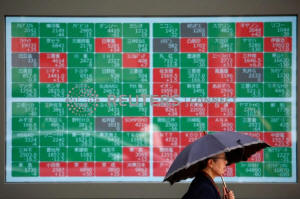|
G20 nerves hit European stocks, dollar;
oil gains
 Send a link to a friend
Send a link to a friend
 [June 24, 2019]
By Karin Strohecker [June 24, 2019]
By Karin Strohecker
LONDON (Reuters) - European stocks stumbled
and the dollar dropped to three-month lows on Monday as hopes waned for
progress in Sino-U.S. trade talks at this week's G20 meeting and fears
grew of a confrontation with Iran.
Investors are waiting to see if Presidents Donald Trump and Xi Jinping
can de-escalate a trade war that is damaging the global economy and
souring business confidence. The leaders will meet during a G20 summit
in Japan.
Pan-European STOXX 600 fell 0.2% , reflecting losses in Paris and Milan.
Stocks in London were little changed. Germany's export-sensitive DAX
fell 0.5% after a profit warning by Daimler caused its shares to drop
nearly 5%.
However, gains in Asia saw the MSCI regional and global stocks gauges
rise again towards last week's six-week highs. Wall Street also looked
in line for more gains after closing lower on Friday. S&P 500 e-minis
pointed to a 0.2% rise at the open.
"G20 is turning into a high-stakes poker game for risk, and if the
sideline talks between Trump and Xi fail and trigger an escalation in
tariffs, the odds of a full-blown global recession increase
exponentially," said Stephen Innes, managing partner at Vanguard
Markets.

On Monday, Chinese Vice Commerce Minister Wang Shouwen said China and
the United States should be willing to compromise in trade talks and not
insist only on what each side wants.
U.S. Vice President Mike Pence's decision on Friday to call off a
planned China speech was also considered a positive sign. Pence had
upset China with a fierce speech in October that laid out a litany of
complaints ranging from state surveillance to human-rights abuses.
Still, most analysts doubt the two sides will come to any meaningful
agreement. Tensions are reaching beyond tariffs, particularly after
Washington blacklisted Huawei, the world's biggest telecoms gear maker,
effectively banning U.S. companies from doing business with it.
"Any high hopes ahead of the G20 meeting may be disappointed," said
Benjamin Schroeder, senior rates strategist at ING in Amsterdam. "In the
end, uncertainty will persist and central banks could still be pushed
closer to invoking their contingency plans."
The U.S. Commerce Department said on Friday it was adding several
Chinese companies and a government-owned institute involved in
supercomputing to its national security "entity list", which bars them
from buying U.S. parts and components without government approval.
A Chinese newspaper said FedEx Corp was likely to be added to Beijing's
"unreliable entities list".
U.S. markets had reached record highs after last week's signals by the
Federal Reserve that it may cut interest rates soon to bolster the U.S.
economy. [.N]
However, that weakened U.S. currency, causing a dollar index to slip
0.1% lower to 96.11 after its biggest weekly drop in four months last
week.
[to top of second column]
|

A passerby walks past in front of a stock quotation board outside a
brokerage in Tokyo, Japan, May 10, 2019. REUTERS/Issei Kato

The dollar has led a broad selloff in major currencies as global
central banks signaled a dovish outlook on monetary policy amid
growing signs of a weak global economy.
The dollar fetched 107.39 yen, having slipped as low as 107.045 on
Friday, the lowest level since its flash crash on Jan. 3.
"The market is not expecting more Fed rate cuts than it had so far,
but that the reasoning behind them is being interpreted in a
different manner," Commerzbank's head of FX and commodity research,
Ulrich Leuchtmann, wrote in a note to clients.
"While for a long time the expected weakening of growth, fears of a
recession and low inflation were used as reasons for rate cuts,
another reason has now been added to the list: the Fed caving in to
the White House."
The euro rose to a three-month high of $1.1387 against the dollar. [FRX/]
In developing markets, the Turkish lira strengthened as much as 2%
after Turkey's main opposition party won Istanbul's re-run election
for mayor, a blow to President Tayyip Erdogan.
Bitcoin pulled back from 18-month highs after jumping more than 10%
over the weekend. Analysts said the gains came amid growing optimism
over the adoption of cryptocurrencies after Facebook announced its
Libra digital coin.
Economic woes, looming U.S. interest rate cuts and tensions between
Tehran and Washington drove gold higher. The precious metal stood at
$1,404.79 per ounce, not far from Friday's six-year high of
$1,410.78.

The rising tensions between Iran and the United States, after Iran
shot down an American drone, also pushed oil prices higher. U.S.
Secretary of State Mike Pompeo said "significant" sanctions on
Tehran would be announced.
Brent crude futures rose 0.4% to $65.42 per barrel, near Friday's
three-week high of $65.76. U.S. crude futures were up 0.9% at
$57.91, standing at its highest in over three weeks. [O/R]
(Reporting by Karin Strohecker in London; additional reporting by
Dhara Ranasinghe and Sujata Rao in London, Hideyuki Sano and Tomo
Uetake in Tokyo, Noah Sin in Hong Kong; editing by Larry King)
[© 2019 Thomson Reuters. All rights
reserved.]
Copyright 2019 Reuters. All rights reserved. This material may not be published,
broadcast, rewritten or redistributed.
Thompson Reuters is solely responsible for this content. |